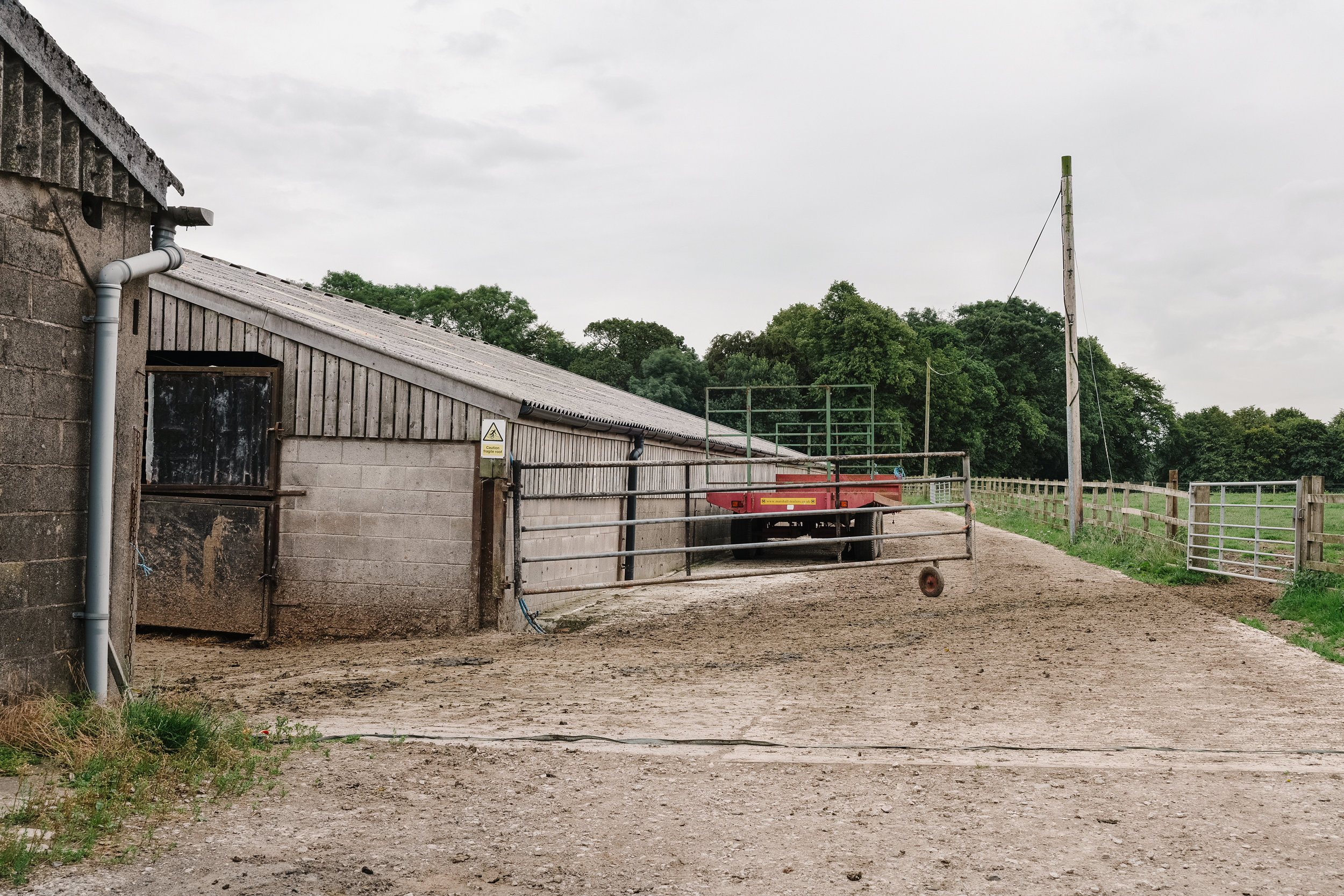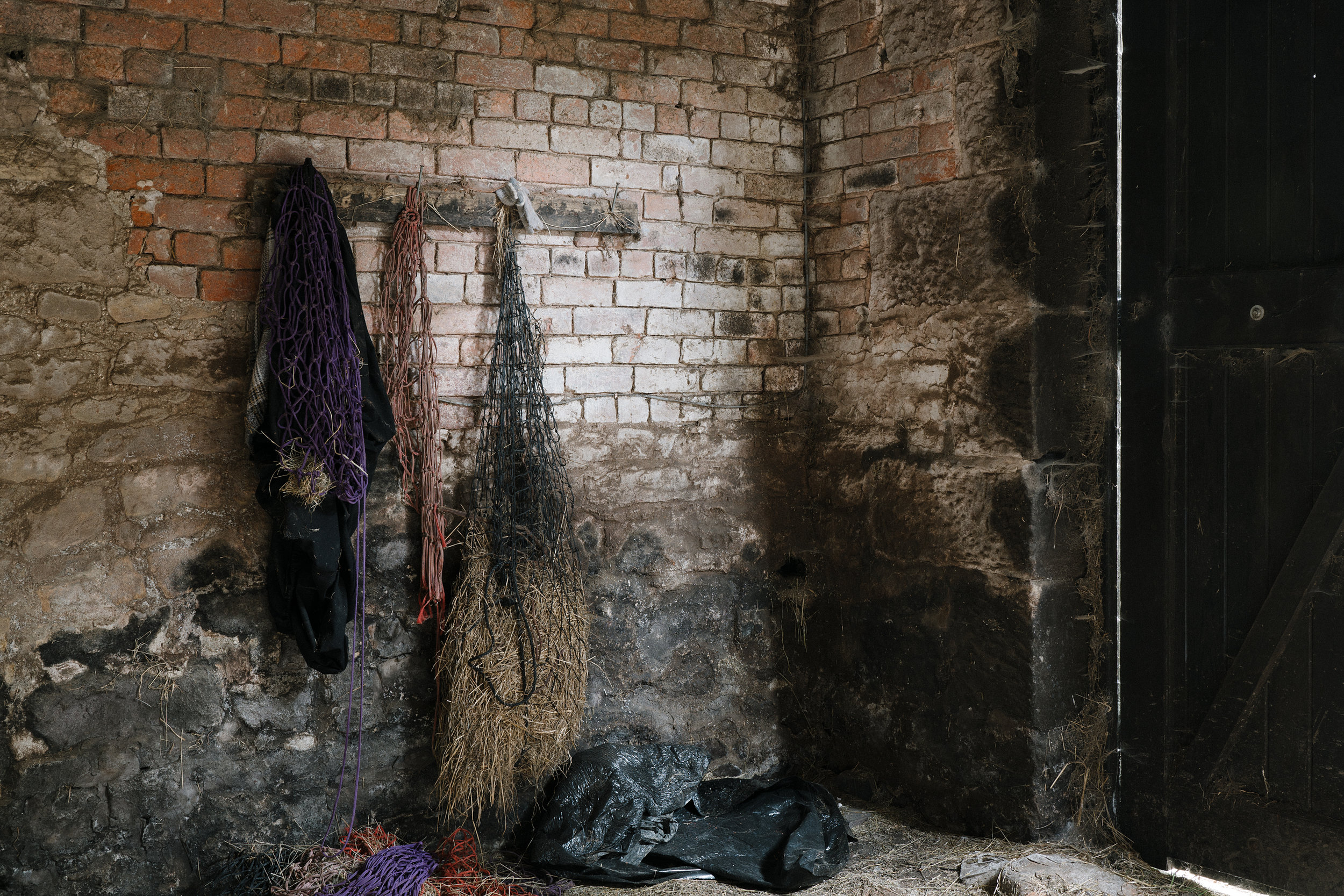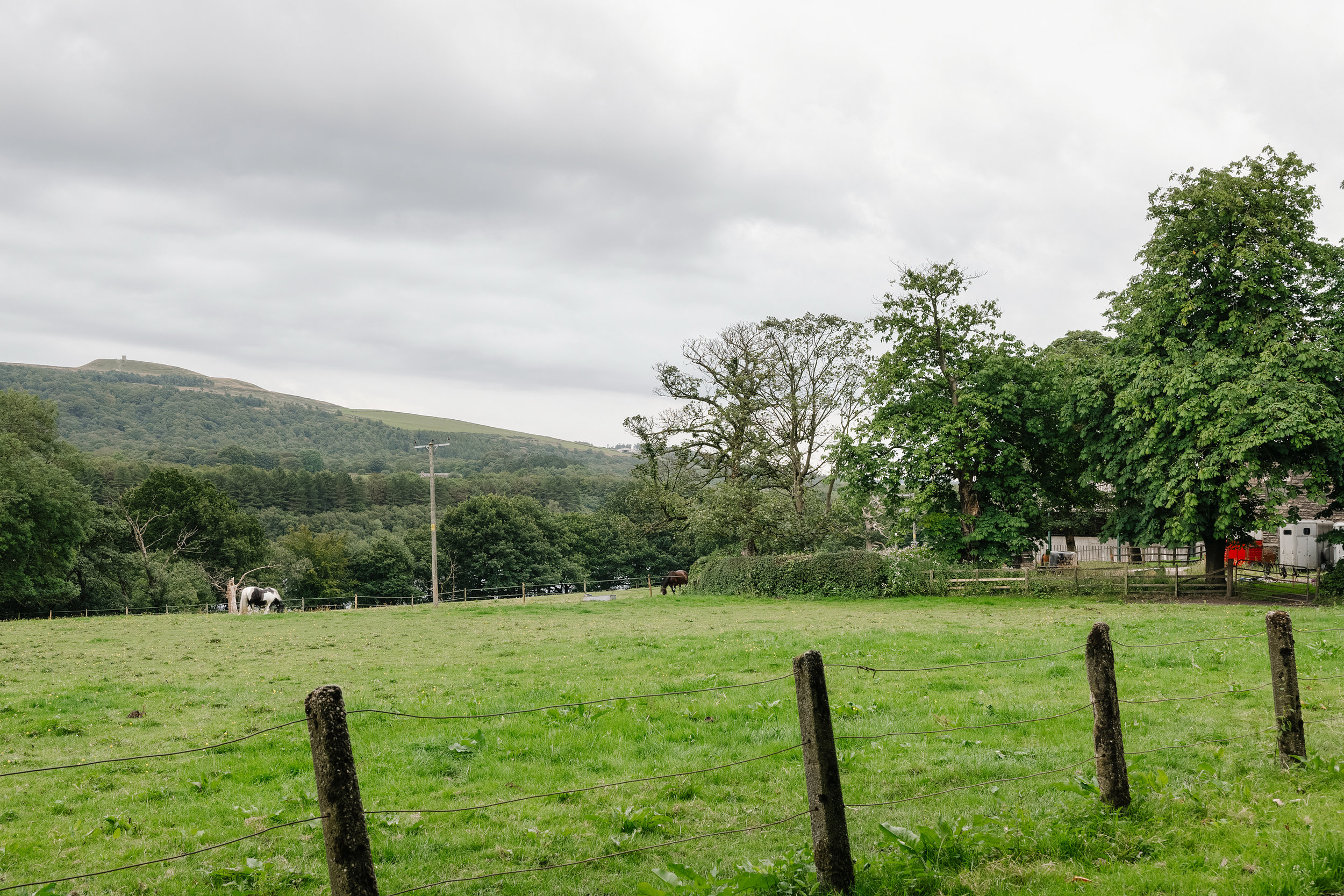If Trees Could Talk — Visiting Rivington Brewing Co. in Chorley, Lancashire
“This is where a coolship would go,” Ben says, pointing an outstretched hand to the furthest corner of the hayloft. “If we got one.”
At that moment, the creaking space around us became a tantalising glimpse of the future. Ben Stubbs has had designs on this building ever since he began making beer at Home Farm with his Brother-in-Law Mick Richardson as Rivington Brewing Co. seven years ago.
Photography by James Pinder
A pulley system hangs from the rafters over the hatch we climbed up, ready for use, decades after its last load of hay had been emptied into the byres below. I held on to the rope to help me back down into the lighter world and said hello to the nodding horses who, rightly, seemed concerned about my lack of farmyard stability.
Back outside, Ben leads us across a cobbled yard into a used cow shed, thick with muck. The cows’ inquisitive pink noses bob into sight through an opening into the main barn, pitch-black against the brightness of our doorway.
“This has been used to house sheep, cows, feed and tractors over the past few hundred years,” says Ben with barely-restrained excitement. “And soon it’ll be our new brewery.”
Tenth generation farmer Mick leans against the stone doorway, letting Ben do most of the talking. When he’s done, we head off with muddy boots to their current setup, a mile or so down a puddled and potholed lane, heavily shaded by the midsummer greenery of thick forest scented with marshmallowy clouds of Himalayan balsam.
It’s in this woodland vale that Tap Beneath The Trees takes place, Rivington Brewing Co.’s summertime taproom gatherings. Over the years these little weekend-long beer festivals have gained cult status among the beer fans of Lancashire. Ben tells me that people come just as much for the countryside convalescence as they do his beers and that he’s completely happy about that.
Rivington and the surrounding countryside is sometimes nicknamed “Manchester’s Lake District”, because of its beautiful, heather-spotted hills, ancient woods and reservoirs that mirror the wide, changeable sky. We pass Tap Beneath The Trees HQ on our way to our next location, a clearing with a bar and mulch paths winding through the wood, and it reminds me of Grizedale, a forest within the Lake District itself.
Even as a passing shower darkens the sky and rattles the corrugated shelter roof, it’s a stunning spot. I want to lay my waterproof jacket out on the ground and sit for a while gulping down a pint of Rivington’s Days of Candy pale ale (on cask, of course) listening to the blackbirds warn us away from their territory.
Ben and Mick’s cautious excitement about the imminent arrival of a 10bbl facility makes sense. It turns out they’ve been making beers that turn traditional pints upside down in a 3bbl brewery. Beers like the fruity, biscuity Rye’n Gosling pale ale, or the refreshingly bitter and juicy American-style IPA, Today Was A Good Day.
They’re then shipped off to pubs and bars no more than 25 miles away, where they’re drunk in long, appreciative draughts by locals proud of these nearby-lads-doing-good.
“We do suffer from a massive sense of imposter syndrome,” Ben says as we stand around the tiny lean-to, clutching mugs of digestive biscuit-coloured tea. “When other breweries give us good feedback we think… But we’re making it in here. Are we good enough?”
A window at the back of the room looks out over the patchwork of their land, and up to the rolling West Pennine moors to Winter Hill and Rivington Pike further beyond. At Rivington Brewing Co., Ben and Mick’s love of their home—and their belief that “traditional” shouldn’t walk hand-in-hand with “conventional”—is pushing them to create beers that break the local mould. Here, in a place where decades roll by like the weather, something new is happening, and I’m here to find out what this is.
***
Katie Mather: Why did you decide to start making American-style pale ales and European-inspired sour beers, on keg, here in the heart of traditional ale country?
Ben Stubbs: It might be the middle of nowhere, but it’s the centre of who we are.
In America, there are hundreds of breweries you’ve never heard of making great beer locally, and that’s what we want to do. I think—I hope—we’ll start to see more of that in the UK. Breweries concentrating on a local level, making the best beer they can make in styles they love, for the people in their local communities.
It’s funny what’s popular, too. Never Known Fog Like It is our best-selling beer by a long, long way, and it’s a 5.2% New England pale ale, murky, and juicy as anything. We have a local landlord who buys whatever we’ve made, no matter the style. It means he ends up with barleywine or grisette on tap in his little pub but he loves it. He wants to support us because he likes our beers, and his customers love to try anything local.
““The people we look up to are all the guys who are never content with the beers that they’re making... You can always be better.””
KM: Why is moving the beer scene forward in Lancashire important to you?
BS: Loads of local breweries around us boast about how they’ve won awards and I don’t think that’s pushing the industry forward. We’re like, “is that really the best beer you can make?”
The people we look up to are all the guys who are never content with the beers that they’re making. Always wanting to improve, that’s where innovation comes from. You can always be better.
I want to bring people to the area. I’m really proud of Lancashire. What I’ve seen in Manchester with people making good coffee, good food, good beer, I want to see it happening here. Look at Preston—there’s such a good little scene there now. Making better beer is our way of contributing to that.
KM: Where does the coolship and your new kit fit in with this vision?
BS: We love making Proper Ace, our grisette with Sorachi Ace, but it takes a couple of months to sell.
Once we get the taproom it’s one we’ll have on year-round because it’s one we love along with our saisons. It’s a traditional farmhouse beer, made in a farmhouse. It makes sense to have it here, and a coolship will add to its sense of place at Home Farm.
There’s no rush though. [Mixed fermentation] beers have been around for hundreds of years, and they’re gonna be around for hundreds more, so we’d rather we take our time, understand the yeast, invest in the barrels and, ultimately, do it well.
KM: How do you bring the farm and your surroundings into the beer you make?
MR: It’s an interesting time in the industry, it’s still so young around here. The direction I’m taking the farm in is based on this movement in America they’re calling “craft beef”—slow-grown animals, smaller herds—that idea’s always been at the heart of our beers too.
Take your time, get it right. Provide a real alternative to mass-produced, low-quality products that are bad quality and worse for the environment.
BS: I worked in the food industry before, and I hated the race to the bottom, the way everything is created with no care for the actual taste of the products, just how well it sells. The way Mick talks about sustainability on this farm, not just about what we make but how we’ll leave Home Farm for future generations just like it’s been left for us, that’s another place it crosses over for me.
When people come to Tap Beneath The Trees, our summertime tap festivals, it’s a chance to get people here to enjoy the area see how important it is too. For a lot of visitors, it gives the beer context—they’re close to the source, they know the story.
KM: Have any of your ingredients come from the farm?
BS: We’ve grown up some wild yeast strains which we’d love to incorporate into our saison or stock ale, but we’ve not used them yet. They’re not where we want them to be at the moment. At the moment we’re only using commercial yeast.
That’s why we can’t wait for our new brewery, because it’ll allow us to make the beers we want to make and share with the local community, which we maybe haven’t been able to achieve on the kit we have right now. We’re looking at foraging for local herbs and aromatics too, but it’s all about waiting for the right time to do it.
MR: We do get a lot of our ingredients locally, though. When we need fruit, for example, we’ll go to Lancashire fruit farm nearby. I want to get more partnerships going with local arable farmers, so we can work together providing local produce for each other.
KM: You make a lot of cask beer, what is it about session beers that inspires you?
BS: Both Pomona Island and Squawk’s session beers have just blown us away with their quality. We thought we were miles off where we needed to be after drinking them. So we’ve spent most of the last year brewing and working on recipes, trying to get to that level.
KM: What else inspires you?
BS: I was listening to a podcast the other day, Mick put me onto it, about Russian River. Vinnie Cilurzo (Russian River’s co-founder) has been doing his thing for 20 odd years and he’s still in the brewery checking the beers every week because he loves it.
That’s what it’s all about. You have to care about what you’re doing.
MR: Rivington Brew Co. will always be a family run business, here on this farm. The 11th generation will hopefully take over from us, and the 12th from them.




























